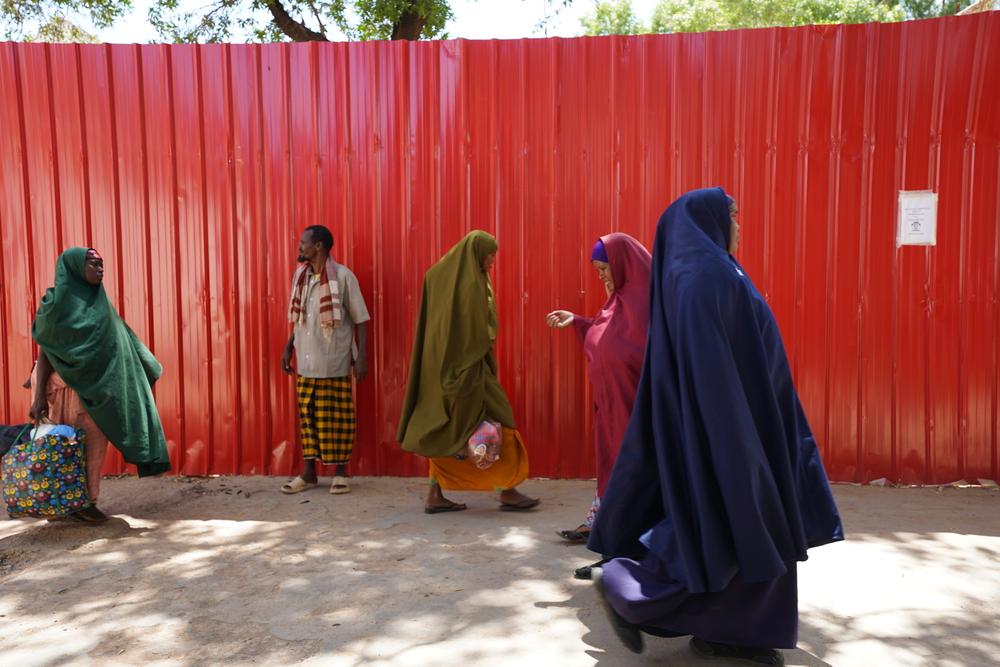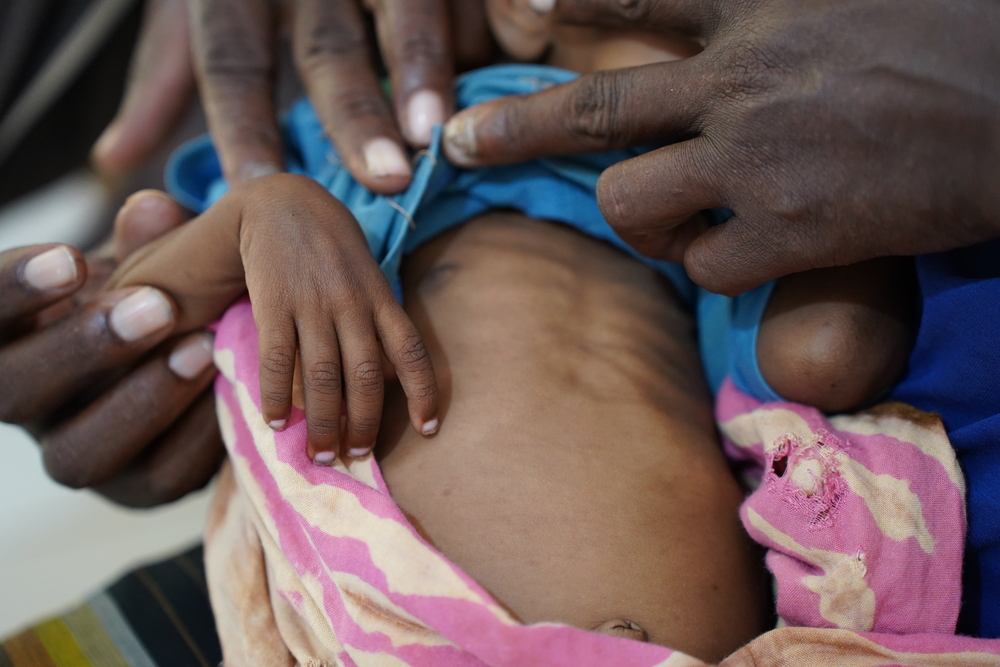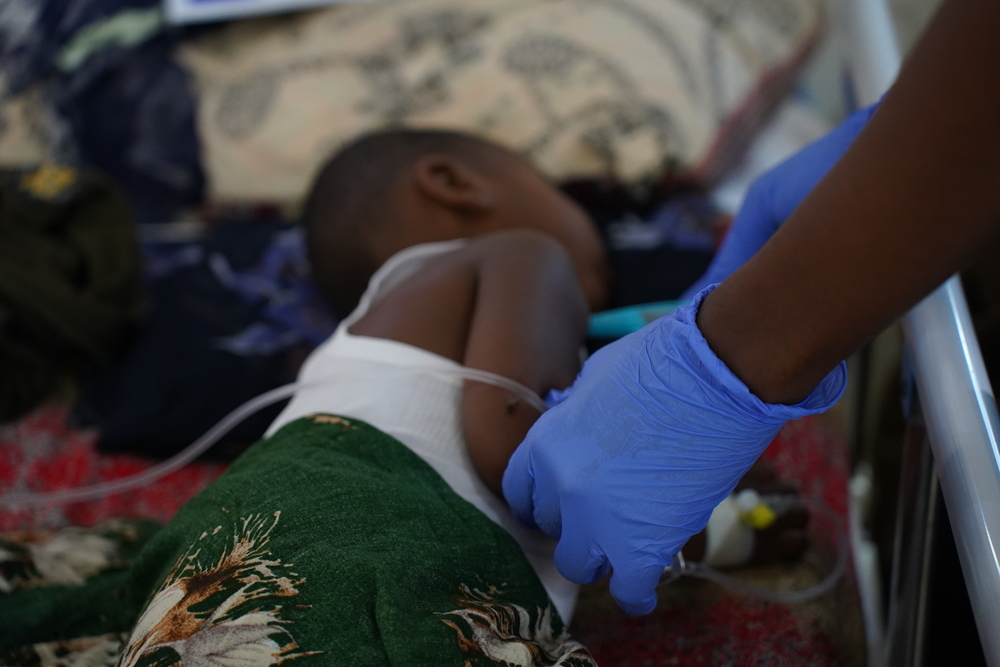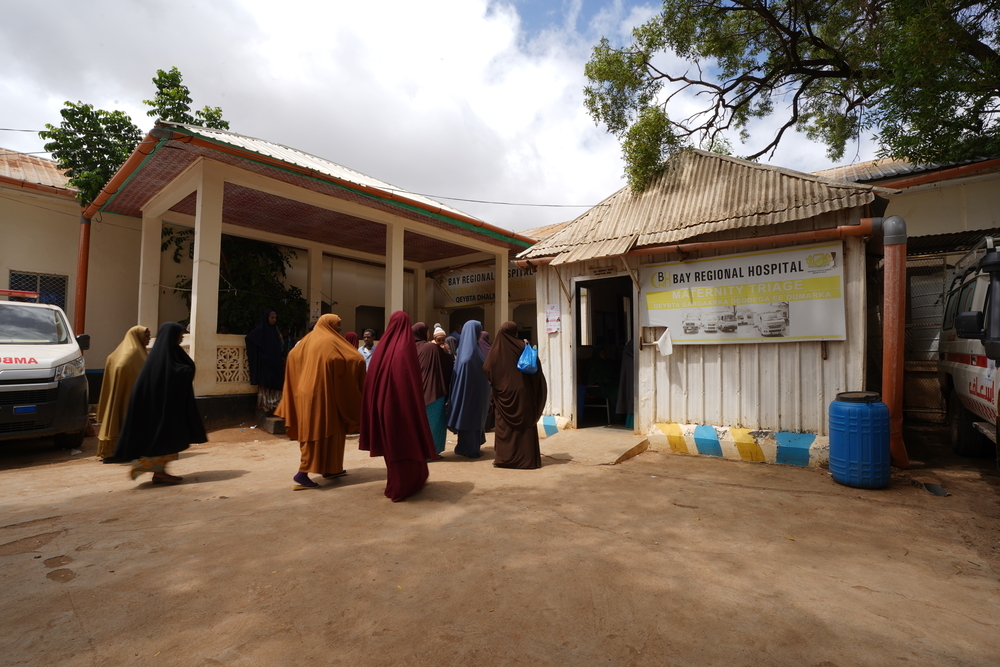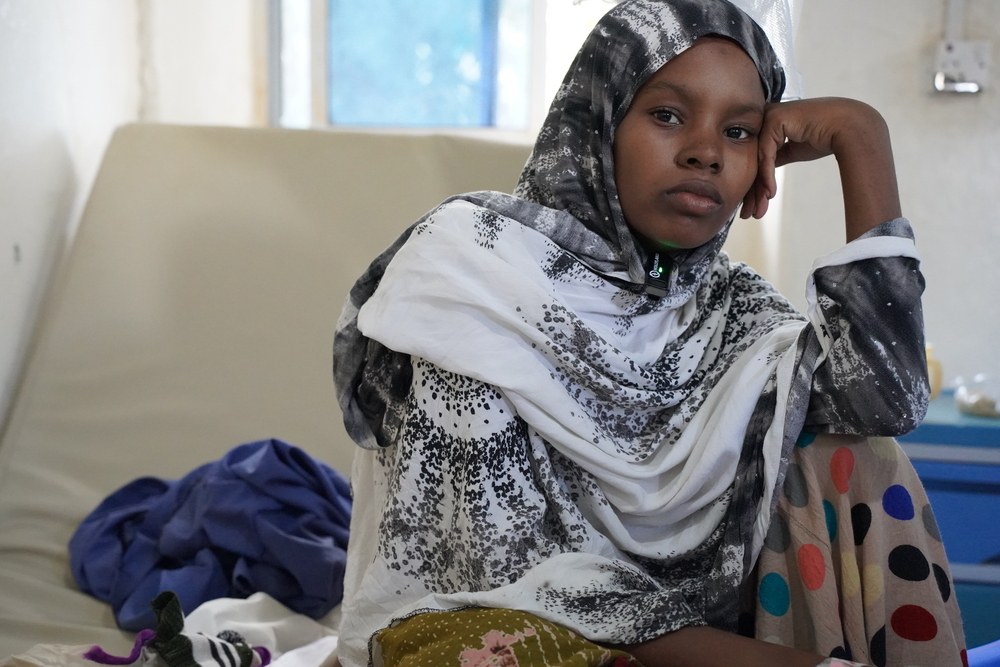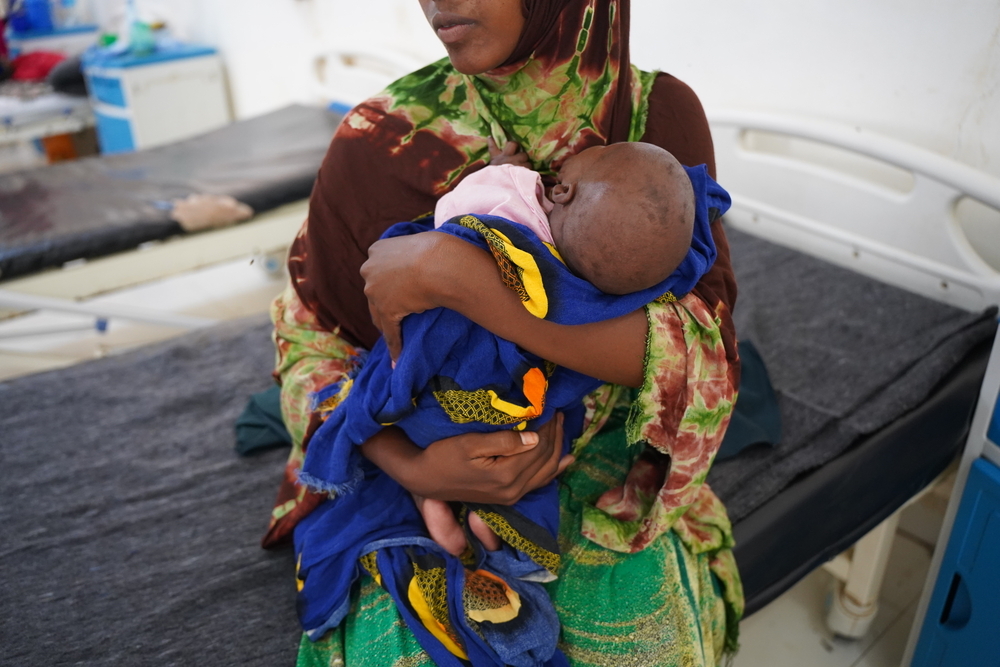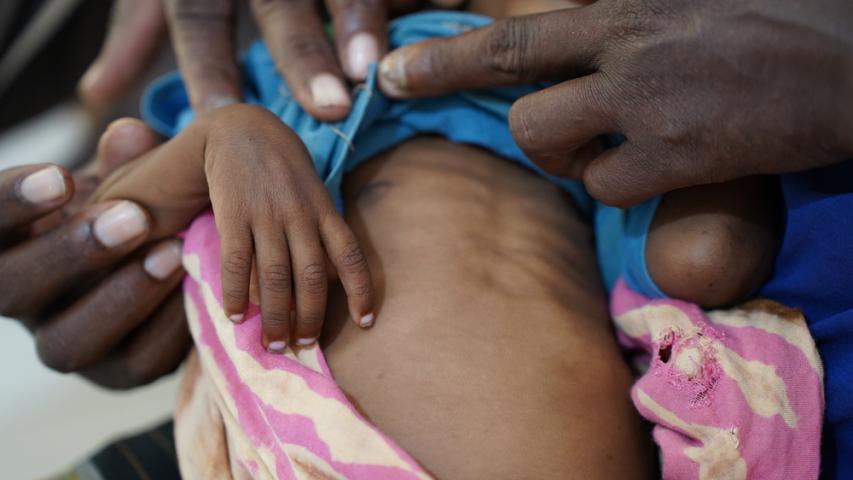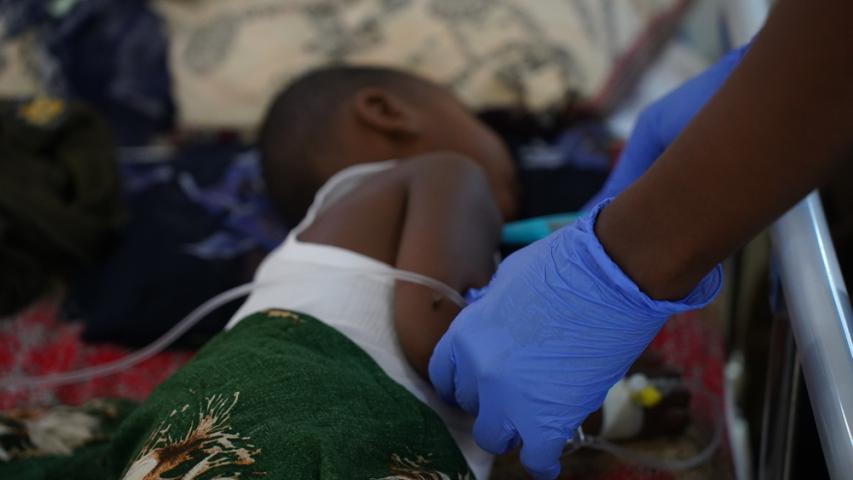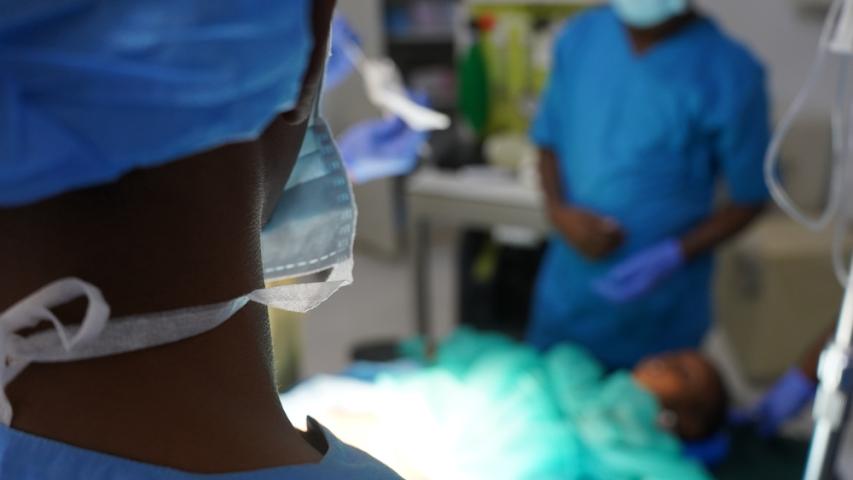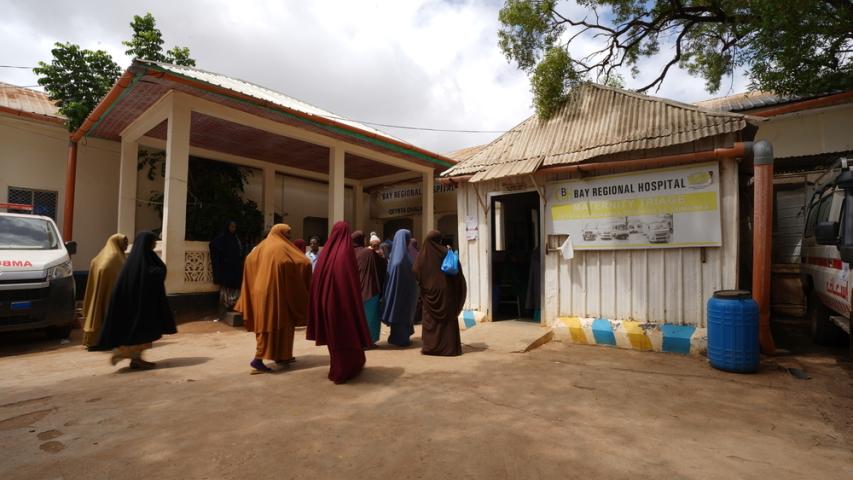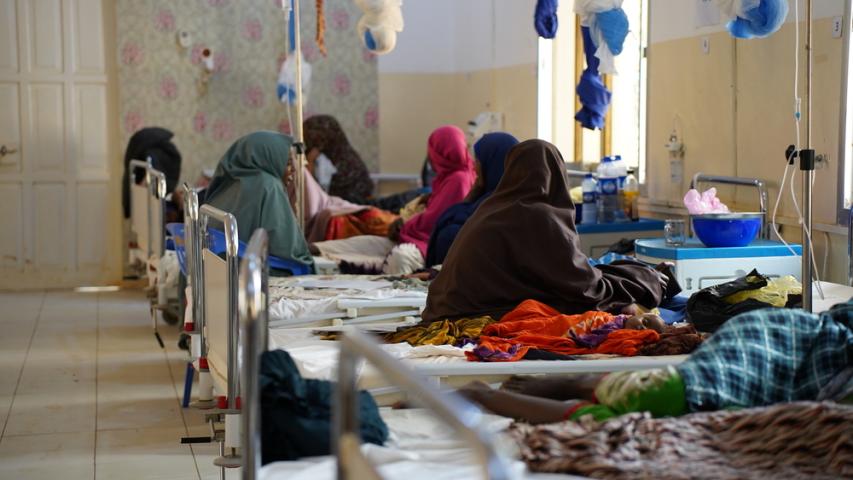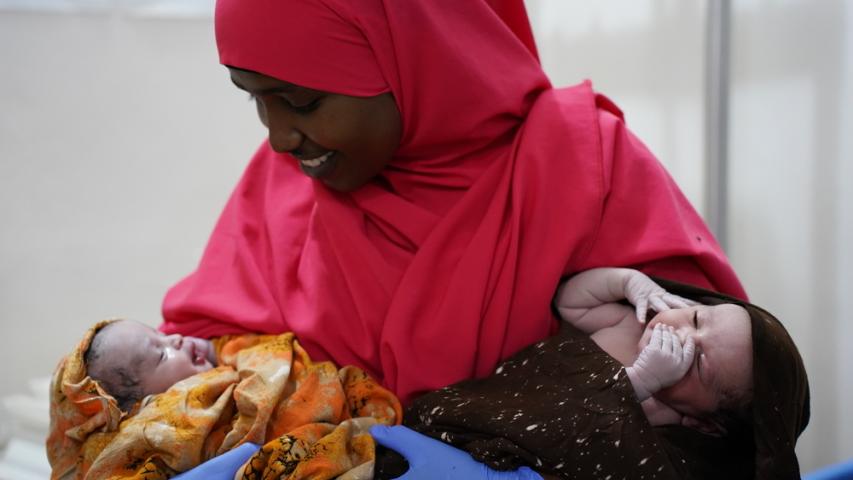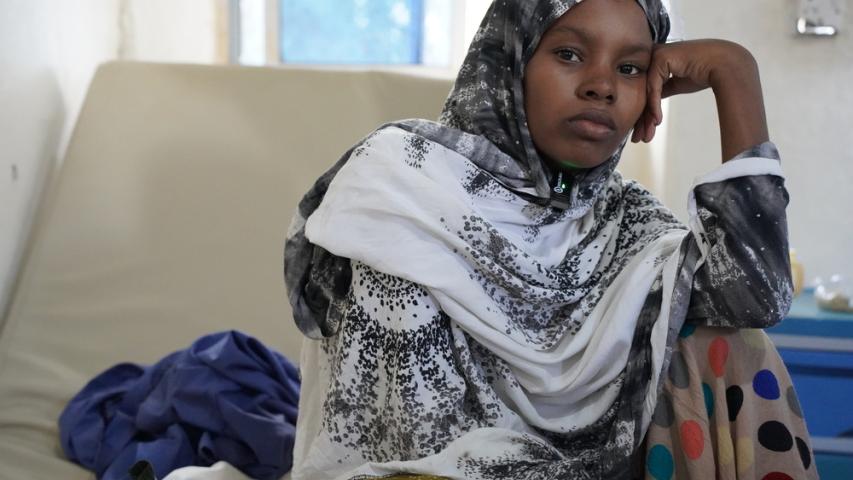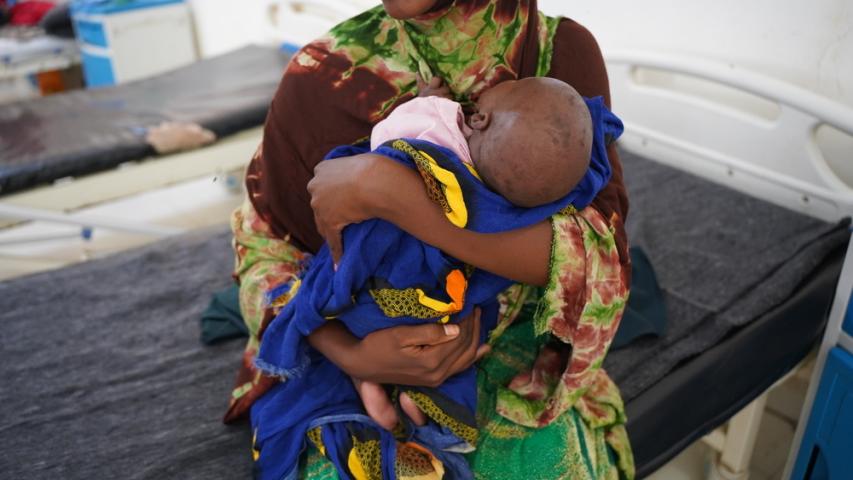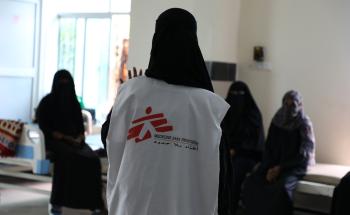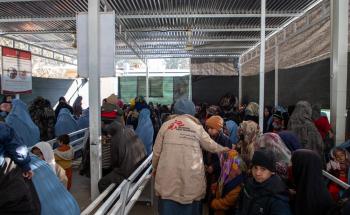When Aisha* began haemorrhaging, experiencing heavy, potentially life-threatening bleeding, just ten days after giving birth to twins at home in Diinsoor district, her family feared the worst. The hospital where she had safely delivered her previous children was no longer operational. With limited healthcare available in their community, her husband urgently borrowed money and drove five hours through the night to reach the MSF-supported Bay Regional Hospital in Baidoa, Somalia, one of the few facilities offering free, quality maternal and paediatric care. Medical teams quickly stabilised Aisha, successfully treating her severe bleeding.
Limited access to healthcare leads to patients arriving at hospitals with severe complications, sometimes resulting in preventable maternal and neonatal deaths. Insecurity, scarce healthcare services, and logistical challenges further hinder access to timely care. Cultural norms such as requiring male consent for surgical interventions add critical delays when immediate action is necessary. Furthermore, health-seeking behaviours present significant challenges.
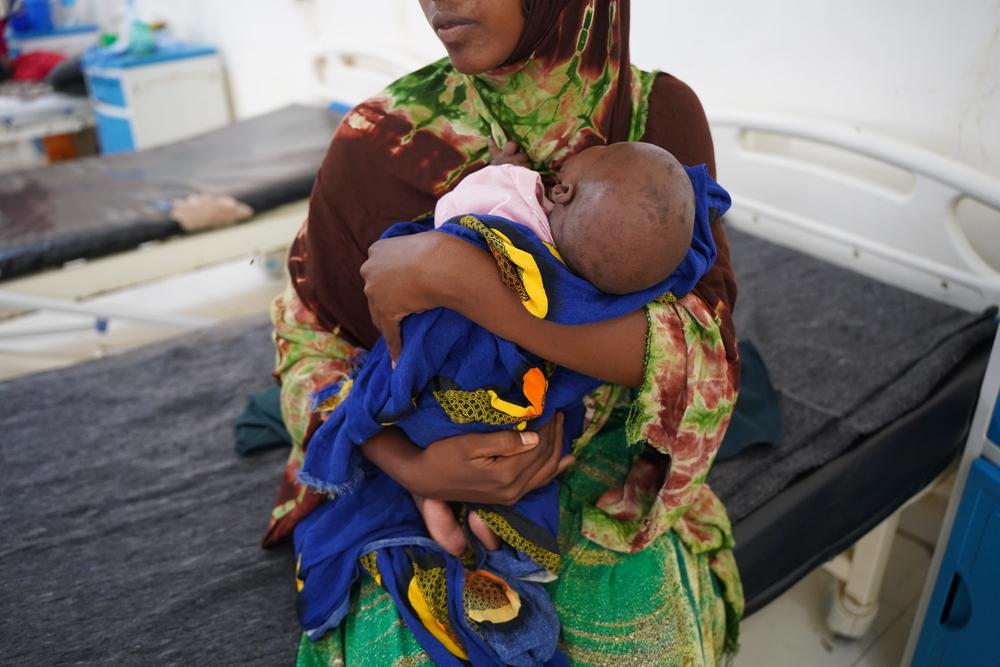
Stories like Aisha’s* are all too common across Somalia’s Southwest State, where women and children often travel hundreds of kilometres seeking lifesaving medical care. Those unable to afford the journey face severe consequences.
Hawa, an 18-year-old mother of two, delivered her first child at age 16 at home with only relatives present. “We don't have hospitals or doctors nearby,” she explains. After her second childbirth, she experienced serious complications, including swelling and cardiac issues. Determined, she travelled to Baidoa for treatment. Now recovering, Hawa voices a widespread hope: “We need a hospital in our area and doctors who can come to us.”
Multiple factors hinder access to care. Poverty, insecurity, distance, and cultural barriers all significantly delay treatment. Hassan, a 28-year-old father from Afurow village, tragically lost his wife during childbirth at home due to the absence of health facilities and skilled birth attendants. Left alone with a newborn son who soon fell critically ill, Hassan struggled helplessly. “He had diarrhoea and vomiting. Medicines from local pharmacies didn’t help,” Hassan recalls. After two months of deteriorating health, he learned of MSF’s free services in Baidoa. “I borrowed about $130 and travelled 150 kilometres to reach Baidoa hospital,” he explains. What began as a desperate situation has turned into hope, as his son receives essential treatment and nutritional care.
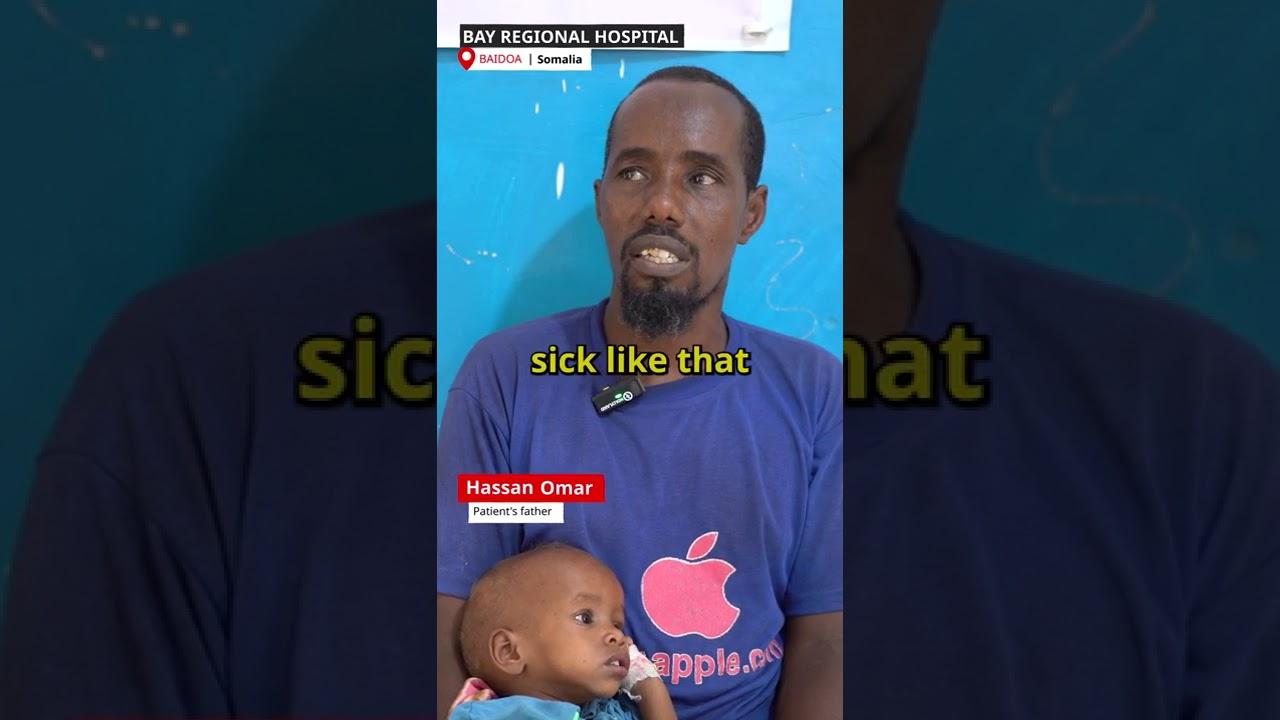
Price of Delay: Funding Gaps and Barriers to Access Undermine Healthcare for Women and Children
MSF has been supporting Bay Regional Hospital since 2017, providing emergency obstetric, neonatal, paediatric, and nutritional care. In 2024 alone, MSF treated over 14,000 children for malnutrition, conducted more than 38,000 paediatric consultations, assisted over 2,800 births, and carried out approximately 35,000 reproductive health consultations, all free of charge. Yet despite these efforts, the region’s maternal and child health situation remains critical, especially after the recent funding cuts.
The suspension of USAID funding has led to the closure of at least 37 health and nutrition sites in both rural and urban areas around Baidoa. Consequently, patient numbers at remaining facilities like Bay Regional Hospital have surged, overwhelming an already fragile healthcare system.
From January to June 2025, MSF teams at Bay Regional Hospital treated 11,894 malnourished children, an increase of 76 per cent compared to the same period last year. This significant surge in malnutrition admissions, along with rising cases of maternal health complications, underscores the urgent need for sustainable and efficient funding to restore and expand essential services, especially in underserved rural communities.
Families frequently delay seeking medical assistance until conditions worsen, often relying initially on traditional healers. Misconceptions surrounding vaccinations, such as beliefs linking them to infertility or other illnesses, further limit access to preventive care. Continuous health education and community engagement are essential to building trust in medical services and encouraging timely care-seeking.
“Maternal and neonatal deaths can be prevented by ensuring pregnant women have timely access to care closer to home. Too often, patients reach us in critical condition simply because healthcare isn’t available nearby,” says Dr. Pitchou Kayembe, MSF’s Head of Program in Somalia.
Dr. Kayembe emphasises that while MSF continues delivering lifesaving care, broader systemic support is vital: “The scale of the need demands sustained, long-term investment and strategic support across Somalia. We urge donors and humanitarian partners to prioritize expanding primary and emergency maternal and paediatric healthcare, particularly in remote areas.”
Inside Bay Regional Hospital’s busy wards, newborns take their first breaths under skilled supervision, malnourished children gradually regain health, and frightened mothers find relief and hope. As Dr. Kayembe concludes, “It’s not just about responding to immediate crises. It’s about ensuring families survive, recover, and rebuild their lives starting with dignified, quality healthcare for all.”
Patient stories
For Hassan, a 28-year-old father from a small village, Afurow, in the Bay region, the birth of his son almost a year ago was a day of both joy and heartbreak. His wife, Fartun, went into labour at home, as there were no health facilities or midwives anywhere nearby. After a long, obstructed labour, Fartun tragically died giving birth to their baby boy. Hassan was devastated. He buried his wife on the same day their son took his first breaths. In the weeks that followed, as he fed his infant goat’s milk from a cup, Hassan kept wondering what he could have done if a hospital or doctor had been within reach. “She didn’t die at a hospital; she died in childbirth at home,” he says quietly, the pain still evident.
Determined to honour his wife’s memory, Hassan poured all his love into caring for their newborn, whom he named Mohamed. But when Mohamed was about ten months old, he fell gravely ill. The baby began suffering from chronic diarrhoea and vomiting, growing weaker day by day. Hassan did what little he could, he bought some pills from a local shop, even tried traditional remedies but nothing improved. “I kept hoping he would recover,” Hassan admits, describing those desperate weeks. In his heart, though, he knew the truth: Mohamed needed real medical care, or he too might not survive.
One Monday afternoon, Hassan finally made a decision. Gathering the modest savings he had left, he wrapped his sick child in a blanket and set out for Baidoa, the nearest city with a hospital. The journey was long and risky (much of the region is perilous to travel), but a neighbour had told him about an MSF-run hospital that treats children for free. Upon arriving at Bay Regional Hospital, Hassan felt a weight lift from his shoulders. The staff admitted little Mohamed immediately. The baby was diagnosed as severely malnourished and dehydrated, likely from prolonged illness. MSF’s doctors started Mohamed on therapeutic food and rehydration fluids at once.
That night, for the first time in months, Hassan slept without fear. “Now, my son is finally getting treatment,” he says, watching over the crib where Mohamed is receiving care. Over the next days, Mohamed’s diarrhoea subsides, and he manages to have a weak smile. Nurses cheer as he finishes a cup of nutrient-rich milk. Hassan knows there is a long recovery ahead (his son is still fragile) but hope has been restored. Hassan plans to tell everyone in his community about what he’s seen in Baidoa. He wants his neighbours to know that free, high-quality care is available if they can reach it. It’s not easy, the journey costs money and time but Hassan believes every parent would do the same if they understood it could save their child. He has already lost a wife to the broken healthcare system; he refuses to lose his son. As he cradles a now-stabilised Mohamed, Hassan allows himself to imagine a happier future. “If Allah wills, we will both go home healthy,” he says. In his grief, he has found a new purpose: to make sure his community’s mothers and children get the chance that Fartun did not.
Amina is a shy 12-year-old child with a bright smile and a serious condition that requires careful management. A year ago, living in a displacement camp on the outskirts of Baidoa, Amina fell extremely ill with high fever, constant thirst, and weakness. Her mother initially thought it was a bad flu, but Amina only got worse. “She had a fever and suddenly became very sick,” recalls her father, Abdullahi. Desperate for answers, they spent what little money they had at a local pharmacy, where she was given pills and told to drink more water. Nothing helped. In fact, Amina lost weight rapidly and became almost too weak to stand.
Finally, a relative urged them to take Amina to the MSF-supported Bay Regional Hospital. There, doctors quickly discovered the truth: Amina’s blood sugar was dangerously high. The fever had likely masked the onset of Type 1 diabetes, a life-threatening condition if untreated. “We had no idea what diabetes was,” Abdullahi says. In their home area, chronic illnesses often go undiagnosed; there are no proper laboratories or specialists, and “apart from tablets like Paracetamol, there are no quality medicines available” locally. If not for the MSF team in Baidoa, Amina might have slipped into a diabetic coma. Instead, she received insulin and fluids that same day, and her condition stabilised. “Alhamdulillah, she is better now than she was when I first brought her,” her father says with a relieved smile.
Now, managing diabetes is part of Amina’s new normal, and MSF continues to be by her side. Every four to six weeks, Amina and her father travel about two hours by tuk-tuk from their camp to the hospital for a check-up and insulin refills. The trip costs around $2, which, as Abdullahi notes, “is not too much money, Alhamdulillah”. What’s more important is that the care at the end of the ride is free and reliable. Amina has learned how to take her insulin injections and check her blood sugar with the help of MSF nurses. Whenever she experiences dizziness or back pain symptoms that used to terrify her, she knows it’s time for a visit. “I only get better when I come to the hospital,” Amina says frankly, adjusting the black bracelet she wears to hide where the IV went in.
Thanks to the consistent treatment, Amina is gaining back weight and even returning to school. She’s one of the few girls in her class who can explain what diabetes is and she does so without shame or fear. In fact, Amina proudly shows her friends the insulin pen that keeps her healthy. Her dream is to become a nurse one day, inspired by those who care for her. “The medicine is what I need, and I hope I will get better and better,” she says softly, confidence growing in her voice. For Amina’s family, the journey from despair to stability has been remarkable. They know diabetes is a long-term challenge, but with MSF’s support, they no longer feel alone in facing it. “This hospital is the one we rely on,” Abdullahi says. “Here, my daughter got a second chance.”
At just 18 years old, Hawa has already experienced the journey of motherhood twice. She gave birth to her first child when she was only 16. “I delivered in the countryside, with my relatives helping me,” she recalls. In Hawa’s rural village, there was no clinic, only a few small pharmacies that sold basic drugs. There is “no large hospital like this one” back home, she explains, referring to Bay Regional Hospital in Baidoa. Without a proper health facility, Hawa’s first delivery was frightening and risky, but she and her baby girl survived.
Two years later, pregnant with her second child, Hawa knew the dangers all too well. When late pregnancy brought complications, swollen legs, a racing heartbeat, and persistent coughing, she made the decision to seek care at Bay Regional Hospital in Baidoa. Though it meant traveling to another city, she sought care at the MSF hospital in Baidoa. “I haven’t seen serious issues that made me come lately,” she first said humbly, but her symptoms told another story. Doctors at the hospital discovered Hawa was developing pre-eclampsia, a condition that could be fatal without treatment. They immediately provided the care she needed, helping her safely deliver a healthy baby boy.
Now recovering in the maternity ward, Hawa feels relief and determination. Seeing what a difference proper medical care makes, she’s become an advocate for women in her village. “We want a large hospital with doctors to be opened for us back home,” Hawa says firmly. She imagines a future where young women like her won’t have to travel or risk home births. Hawa’s courage in seeking help ensured her children have a healthy mother. Now she’s using that same courage to call for better healthcare for her entire community. “We just need a chance,” she says. “If a hospital is built for us, we will use it. We want our mothers and babies to live.”
Madiina had already endured more hardship than most. Her mother, a mother of six, had delivered her previous children at the hospital in Diinsoor, back when it was still functioning. But by the time Madiina was ready to give birth to her first child, the facility was no longer operational, leaving her with no choice but to deliver at home.
She gave birth to a healthy baby in a makeshift hut. Ten days later, however, she began bleeding severely. Her family rushed to help, but the bleeding wouldn’t stop, and her life was in danger. With no medical facility nearby, her husband acted quickly: he borrowed money, arranged a car, and drove almost five hours to Baidoa in a desperate bid to save her.
“The vehicle dropped us off right at the hospital door,” he recalls. “Once she was brought here, treatment started, and now she has recovered, Alhamdulillah.”
At MSF’s Bay Regional Hospital, doctors transfused blood and treated Madiina’s haemorrhage. She survived against the odds.
As she regained strength, Madiina and her mother were struck by the kindness surrounding them. The hospital provided not only free medicine but also food and water for both of them—something they never expected. “Since I’ve been here, not even a single cup of tea had to be brought from outside. We get all our meals here, me and my daughter,” her mother says with gratitude.
Now back home in Diinsoor, Madiina is enjoying motherhood and sharing her experience. “This hospital is very good,” she says. “Whenever I call relatives, I tell them how they saved us.”
*All patient names have been changed to protect privacy.
For over four decades, Doctors Without Borders (MSF) teams have been providing medical and humanitarian care to the Somali people across the Horn of Africa. In Somalia, MSF continues to respond to the medical needs of people displaced by ongoing conflict and extreme weather events, and to support services in Ministry of Health facilities. A significant part of our work focuses on capacity building and specialised training for healthcare staff, improving the quality of healthcare, rehabilitating hospitals, enhancing water, sanitation and hygiene services, and conducting health education sessions to ensure infection prevention and control in health facilities. MSF is currently running medical activities in two locations: Baidoa, Bay Region (Southwest State), and Galkayo North (Puntland State) and Galkayo South (Galmudug State).
